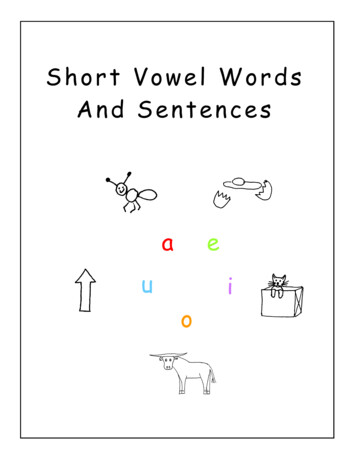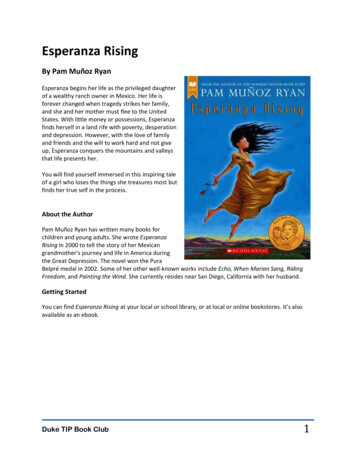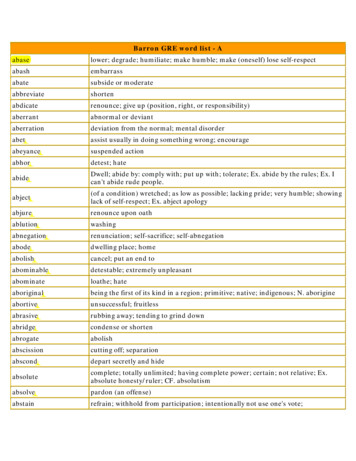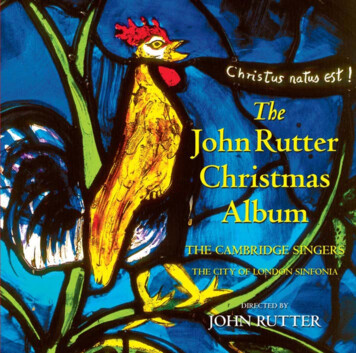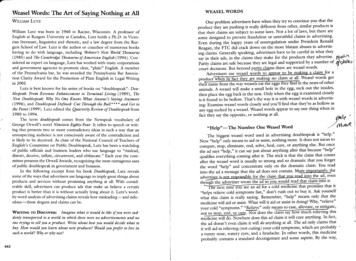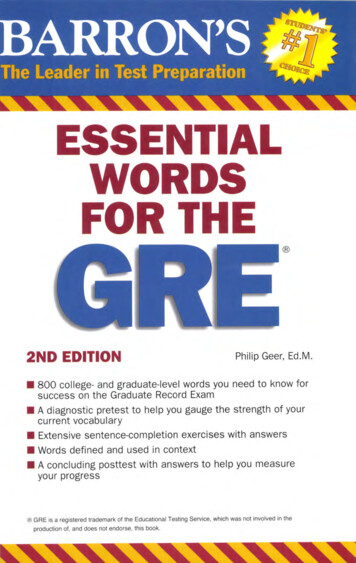
Transcription
ESSENTIALWORDSFOR THE2ND EDITIONIIIIIPhilio Geer. Ed.M.800 college- and graduate-level words you need to know forsuccess on the Graduate Record ExamA diagnostic pretest to help you gauge the strength of yourcurrent vocabularyExtensive sentence-completion exercises with answersWords defined and used in contextA concluding posttest with answers to help you measureyour progress@ GRE isa registered trademark of the Educational Tesling Service, which was not involved in theoJ, and does not endorse, this book.oroduclion
BARRON’SESSENTIALWORDSFOR THESECOND EDITIONPhilip Geer, Ed.M.Your Vocabulary for Successon the GRE General TestBARRON’S GRE is a registered tra d e m a rk o f Educational Testing Service (ETS). This p ub licatio n is not endorsedor approved by ETS.
About the AuthorPhilip Geer has taught English language and literature for many years in the UnitedStates and abroad. He is the author of several textbooks and test preparation books,including the GRE Verbal Workbook and Wordfest: Your Vocabulary fo r Lifelong Learning,both published by Barron's, and the academic director of Mentaurs Educational Con sultants. Visit the Mentaurs website at www.mentaurs.com to learn more about buildingyour GRE vocabulary skills. You can contact Philip Geer at director@mentaurs.com forguidance in your GRE Verbal Reasoning and Analytical Writing preparation.The excerpts and sample sentences included in this book are for educationalpurposes only. They should not be taken to reflect the views of either the authoror Barron’s Educational Series, Inc. Copyright 2010, 2007 by Barron’s Educational Series, Inc.All rights reserved.No part of this publication may be reproducedor distributed in any form or by any meanswithout the written permission of thecopyright owner.All inquiries should be addressed to:Barron’s Educational Series, Inc.250 Wireless BoulevardHauppauge, NY 11788www.barronseduc.comISBN-13: 978-0-7641-4478-3ISBN-10: 0-7641-4478-2Library of Congress Catalog Card No.: 2009039837Library of Congress Cataloging-in-Publication DataGeer, Philip.Essential words for the GRE / Philip Geer. — 2nd ed.p. cm.Includes index.ISBN-13: 978-0-7641-4478-3ISBN-10: 0-7641-4478-21. Graduate Record Examination—Study guides. 2. Englishlanguage—Glossaries, vocabularies, etc. 3. Vocabulary—Problems,exercises, etc. I. Title.LB2367.4.G43 2010378.1 662—dc222009039837PRINTED IN THE UNITED STATES OF AMERICA9 8 7 6
Co n te n tsINTRODUCTION:MASTERING ADVANCED VOCABULARY FOR THE GRE1-10PRETEST11-21300 ABSOLUTELY ESSENTIAL GRE WORDS22-24800 HIGH-FREQUENCY GRE WORDS25-264FINAL REVIEW265-272300 HIGH-FREQUENCY WORD ROOTS273-360COMMON SUFFIXES361-363POSTTEST364-374ANSWER KEY375-393INDEX394-396
ACKNOWLEDGMENTSI would like to thank Susan Geer for her invaluable assistance in thepreparation of this book.I am grateful to the following for permission to reproduce copyrightmaterial:Singapore Press Holdings for the article “Delving into the Mind ofa Great Thinker, Chomsky” from The Straits Times Guide to GoodEnglish and Greater Knowledge, copyright 2005.Harper San Francisco for an extract from The Historical Jesus,The Life o f a Mediterranean Jewish Peasant, John Dominic Crossan, copyright 1992 by John Dominic Crossan. Reprinted by permissionof HarperCollins publishers.Peter Saunders for extracts from Insights: A Comprehensive Approachto the General Paper, Peter Saunders and Philip Geer, Longman,Singapore, copyright 1982.
Introduction:Mastering AdvancedVocabulary for the GREAs a student preparing for the verbal section of the GRE, you have topractice the skills of analyzing information in a passage, understandingthe relationships among parts of a sentence, and comprehending rela tionships between words and concepts in context. To do this, youshould work through the skills section and practice tests in a reputableGRE General Test guidebook, such as Barron’s GRE. You also need toread widely, thinking critically about what you read. You should readgood periodicals, such as The New York Times, The Christian ScienceMonitor, The Atlantic, The New Yorker, Time, The Economist, and ScientificAmerican. In addition to reading these types of periodicals, you shouldread books that develop more extended arguments, such as Consilience,the Unity o f Knowledge by the eminent scientist Edward O.Wilson and Beyond Freedom and Dignity by the influential modernthinker B. F. Skinner. Reading such material will increase your knowl edge in important areas. It will also improve your ability to understandcomplex sentence structure and follow a sophisticated line of reasoning.If, as you read, you look up unfamiliar words in a good dictionary, yourvocabulary will also improve.Speaking of vocabulary, is it important to have a good knowledge ofadvanced words to do well on the GRE? The answer is “Yes, definitely.”The test places considerable emphasis on advanced vocabulary, espe cially in the sentence equivalence and text completion questions. Let’stake a look at some of these types of questions to see how importantvocabulary is on the GRE.1
ESSENTIAL WORDS FOR THE GRESENTENCE EQUIVALENCE AND TEXT COMPLETIONQUESTIONSIn the sentence equivalence question below, you must choose twoanswers that could correctly complete the sentence.It would be difficult to imagine two more different personalities:Liz is shy and taciturn, while Stan is outgoing an d(A) salubrious(B) laconic(C) specious(D) loquacious(E) doctrinaire(F) talkativeCould you answer this question correctly without knowing the meaning ofthe advanced word in the sentence, taciturn (uncommunicative, notinclined to speak much), and the meanings of the five advanced wordsthat appear in the answer choices? If you don’t know the meanings ofsalubrious, laconic, specious, loquacious, and doctrinaire, you will be forcedto guess one of the correct answers to this question, (D) loquacious, whichmeans (F) talkative, the second correct answer. Not all sentence equiva lence questions are so vocabulary-dependent, but you can expect quite afew to require a knowledge of very advanced words.Let’s take a look at another question that requires a knowledge ofadvanced words.In most modern industrial countries, government intervenesin the economy by changing fiscal and monetaiy policy tothe negative effects of the business cycle, despitethe fact that there exists no theory supported by conclusiveevidence to explain the underlying cause of the business ate2
INTRODUCTION: MASTERING ADVANCED VOCABULARY FOR THE GREIf you don’t know the definition of mitigate (to cause to become lessharsh, severe, or painful), you will not be able to answer this questioncorrectly. Also, the more words you know in the other answer choices,the more confident you can be in answering the question.Here’s a question that requires you to choose words to fill in two blanks.Some scholars deny that there is a direct correlation betweenthe scientific theory of relativity and intellectual fashions in thearts, pointing out that many important modernist works suchas Igor Stravinsky’s (i) symphony The Rites o f Spring(ii) the theory of eephemeralsubsumeIn this question, all of the answer choices are advanced words. It is notpossible to answer this question correctly without knowing the mean ings of these advanced words, especially the meanings of the correctanswer choices (i) seminal (containing the seeds of later development)and (ii) antecede (precede).The final question below also requires you to fill in three blanks.The phrase “It’s a matter of (i) ” is often used to indi cate that the real meaning of a statement is being lost in ver biage, often with the implication that there is (ii) or nequivocation3
ESSENTIAL WORDS FOR THE GRETwo key words in the sentence—verbiage and implication—are advancedwords. It would be impossible to figure out the central meaning of thesentence without knowing the meaning of verbiage (an excess of wordsfor the purpose)—and if you don’t know the meaning of implication (thatwhich is hinted or suggested) you will be hard-pressed to follow the logicof the sentence.Advanced vocabulary also plays a central part in the answer choicesgiven for this question. Once again, this question would be impossibleto answer without knowledge of the meanings of these difficult words. Ifyou know that semantics means the meaning and interpretation ofwords, obfuscation means the act of confusing or obscuring, and equiv ocation means the intentional use of vague language, the sentencemakes good sense.READING QUESTIONSNext, let’s consider a GRE-level reading passage and questions. It usesquite a lot of advanced vocabulary. Do you know the difficult words inthe passage and in the questions that follow it?(5)(10)(15)(20)4To chop a stick, to catch a fly, to pile a heap of sand, is asatisfying action; for the sand stays for a while in its novelarrangement, proclaiming to the surrounding level that wehave made it our instrument, while the fly will never stir northe stick grow together again in all eternity. If the impulsethat has thus left its indelible mark on things is constant inour own bosom, the world will have been permanentlyimproved and humanized by our action. Nature cannot butbe more favorable to those ideas which have once found anefficacious champion.Plastic impulses find in this way an immediate sanctionin the sense of victory and dominion which they carry withthem; it is so evident a proof of power in ourselves to seethings and animals bent out of their habitual form and obedient instead to our idea. But a far weightier sanctionimmediately follows. Man depends on this for his experi ence, yet by automatic action he changes these veiy thingsso that it becomes possible that by his action he should pro mote his welfare. He may, of course, no less readily precipitate his ruin. The animal is more subject to vicissitudesthan the plant, which makes no effort to escape them or togive chase to what it feeds upon. The greater perils ofaction, however, are in animals covered partly by fertility,partly by adaptability, partly by success. The mere possibil-
INTRODUCTION: MASTERING ADVANCED VOCABULARY FOR THE GRE(25)(30)ity of success, in a world governed by natural selection, isan earnest of progress. Sometimes, in impressing the envi ronment, a man will improve it: which is merely to say thata change may sometimes fortify the impulse which broughtit about. As soon as this retroaction is perceived and the actis done with knowledge of its ensuing benefits, plasticimpulse becomes art, and the world begins actually tochange in obedience to reason.—George Santayana (1906)1. Based on the information in the passage, which of thefollowing statements would the author be least likely toagree with?(A) Art is an inherently irrational process.(B) Even the most esoteric works of art have their originin the human impulse to act on nature, changing itto conform to an idea in the mind.(C) Any viable theory of aesthetics must take into accountman’s relationship to nature.(D) The effects of human action on nature can be eitherbeneficial or harmful to humans.(E) All living things are subject to the process of naturalselection.2. The word sanction as it is used in line 11 most nearly approvalexcuse3. The phrase plastic impulses as it is used in line 11 mostnearly means(A) drives possessed by all living things to subjugate andexploit other living things(B) irrational and futile human drives to dominateintractable nature(C) human desires to shape malleable nature(D) pathological urges to pervert the proper functioningof the natural order(E) natural urges in human beings to depict theirphysical environment with verisimilitude5
ESSENTIAL WORDS FOR THE GREThis passage uses a lot of quite advanced vocabulary (indelible, domin ion, retroaction, ensuing) as well as some very advanced vocabulary (effi cacious, plastic, sanction, precipitate, vicissitudes). You should already befamiliar with the first group of words, while you may not know the moreadvanced words. Not knowing any of these words would make it difficultto understand this passage. The word plastic is especially important,because it expresses one of the central concepts discussed by theauthor—the human ability to consciously shape nature.Advanced vocabulary is also used in the questions. It is not possibleto answer the first question without knowing the meaning of inherently,esoteric, viable, and aesthetics. (The correct answer is A.) You can arriveat the answer to the second question if you know the meaning of sanc tion in the passage. (The answer is D.) The third question contains a lotof advanced vocabulary [futile, intractable, malleable, pathological,verisimilitude), so once again it is not possible to answer this questionwith confidence without knowing the meanings of these difficult words.If you don’t know that malleable means capable of being shaped, youwill not be able to decide that choice (C) makes the best sense.From our analysis, it is clear that vocabulary plays a critical part inanswering GRE Verbal Reasoning questions. Many of the questionsmake extensive use of advanced vocabulary. Therefore, what it boilsdown to is that, to give yourself a good chance to correctly answer ques tions with a lot of advanced vocabulary, you should learn the words thatare most likely to appear in such questions.LEARN FREQUENTLY TESTED GRE WORDSLet’s look at the advanced words that appeared in a sample verbal sec tion of the GRE published recently by the Educational Testing Service.As a college graduate (or soon to be college graduate), you shouldalready be familiar with many of these words. However, there are somewith which you are probably not familiar. Look through the list. Howmany of these advanced words do you know? You probably know someof them, while others look familiar but you are not sure what they mean.Soon, you will have a chance to take a test to tell you exactly what yourvocabulary situation is for the GRE. Words that appear in bold arewords that have appeared with the most frequency on the GRE over thepast 25 cularorthodoxy
INTRODUCTION: MASTERING ADVANCED VOCABULARY FOR THE citurntensileunorthodoxTurn to 300 Absolutely Essential GRE Words on page 22 and check tosee if it contains the high frequency words in bold from the list above.Yes, these words, or one of their forms, are all on the list of the 300words that appear repeatedly on the GRE and thus can be learnedspecifically for the test. These 300 words, as well as an additional 500important, frequently occurring GRE words, will be taught to you inEssential Words fo r the GRE.HOW ESSENTIAL WORDS W ILL HELP YOUDO W ELL ON THE GREEssential Words for the GRE teaches 800 advanced words that frequentlyappear on the GRE. Each word has been carefully selected through ref erence to published GRE lists and on the basis of my many years of expe rience in preparing students for the test. These 800 words also appear inBarron’s GRE Master Word List and High-Frequency Word List.The principle behind this book is that the best way to learn new wordsfor the GRE is to see how these words are used in complex sentencesand practice on exercise material that is similar in content, structure,and level of difficulty to that which appears on the actual test. Practic ing on such material will improve your skills in understanding complexsentences and arguments, and increase your familiarity with importantideas that appear on the GRE.7
ESSENTIAL WORDS FOR THE GREThis book teaches the important words you need to know in units often words each, along with their parts of speech, most commonly useddefinitions on the GRE, and illustrative sentences showing how wordsare used. The content, style, and tone of the illustrative and exercisematerial are consistent with that of material appearing on the actualGRE. Because sentences generally deal with subjects in the arts, sci ences, and social sciences, and definitions of important terms are pro vided, you will build up your general knowledge while you learnimportant advanced words. Comprehensive exercises at the end of eachunit ensure that you know the words and provide practice in their cor rect use. Many of the words taught in a given unit reappear in subse quent units, both in illustrative sentences and in exercises, providingsystematic reinforcement of learning.Keep a good college dictionary handy as you work through this book.This will allow you to explore additional meanings of words you learnand fine-tune your understanding of nuances in meaning between sim ilar words. Two of the best college dictionaries are The American Her itage College Dictionary (4th Edition) and Merriam-Webster’s CollegiateDictionary (11th Edition). If you prefer to use an online dictionary, theexcellent American Heritage Dictionary o f the English Language, (4th edi tion) is available online for free at Bartelby.com.M ASTERING HIGH FREQUENCY W ORD ROOTSOther than learning the difficult words likely to appear on the GRE, howelse can you improve your chances of doing well on the GRE Verbal Rea soning test? The answer is simple: learning important word roots.Essential Words fo r the GRE features extensive information on wordroots, prefixes, and suffixes in the High Frequency Word Roots section.This section contains a list of the 300 most important Latin and Greekroots and prefixes that commonly appear in English words. It also givesyou hundreds of derivative words and includes exercises to improveyour ability to make use of roots in remembering words you havelearned in this book and in deciphering the meaning of words you don’tknow. In addition to being useful for students taking the GRE, aknowledge of word roots provides a great foundation for the studentembarking on a career in fields such as law, science, and medicine thatuse many specialized terms based on Latin and Greek.8
INTRODUCTION: MASTERING ADVANCED VOCABULARY FOR THE GREGETTING STARTEDSo, what do you do now? First, take the Pretest on the following pages.This will tell you how many advanced words you already know. ThePretest contains sentence completion exercises and reading passageswith vocabulary questions. If you don’t do well on the Pretest, it wouldbe a good idea to get hold of a good book that teaches a comprehensivelist of college-level words, such as Barron’s Wordfest!, and review thesewords before starting Essential Words fo r the GRE.Philip Geerdirector@mentaurs.com9
PretestIt’s time to test your readiness fo r graduate-level reading. Don’t worry. Ifyou aren’tfamiliar with the GRE words tested below, you can be sure youwill learn them in Essential Words for the GRE.In the questions below, choose the answer that is most nearly oppositein meaning to the capitalized word.1. nsouciantimplacable2. iumpanegyric3. ESSAY(A)(B)(C)(D)(E)suggestattemptgive upleaveremember4. squeaustere11
ESSENTIAL WORDS FOR THE GRE5. fytell the truthforestallIn the questions below, choose the answer that gives the pair of wordswhose relationship is most like the relationship expressed in the pair ofcapitalized words.6. METTLESOME : SOLDIER ::(A)(B)(C)(D)(E)wise : sageerudite : professorsardonic : lawyerofficious : governorpedantic : teacher7. ONOMATOPOEIA : SOUND ::(A)(B)(C)(D)(E)mnemonic : memorysimile : comparisonphysiognomy : faceparrot : actionenunciation : pronunciation8. TRYST : LOVER ::(A)(B)(C)(D)(E)assignation : paramourmeeting : companyrendezvous : friendparty : childexam : student9. SKEPTIC : DOUBT ::(A)(B)(C)(D)(E)12plutocrat : investsycophant : fawnraconteur : laughzealot : vituperateegotist : brag
PRETEST10. FILIBUSTER : TACTIC ::(A)(B)(C)(D)(E)ruse : subterfugeriposte : strategylitigation : lawgerrymandering : quibblehieroglyphic : writingChoose the best word or set of words to fill in the blanks in each o f thesentences below.11. The statement “India has recently made great progress inpoverty” should be seen in thecontext of India’s vastpopulation of one billion, of which 320 million remain ocalalleviating.abject12. In his book Knowledge and Wisdom, the distinguished twentiethcentury philosopher Bertrand Russell said, “Although our age farsurpasses all previous ages in knowledge, there has been noincrease in ogousprodigiousimminent13. Increased tariffs in the 1930s a collapse in worldtrade, the Great d.ridiculinginstigated.forgivingcaused. amelioratingprecipitated.exacerbating13
ESSENTIAL WORDS FOR THE GRE14. The main impetus behind America’s development of the hydrogenbomb was Edward Teller, a Hungarian refugee who had fledNazism and w h o th e system that was inplace in the Soviet Union and the Eastern Bloc nevolentmaligned.meritorious15. Physicists now believe that what had been considered the mostbasic constituents of the universe are in turn comprised of evenmore fundamental units, called quarks— given thatby a physicist familiar with James Joyce’s novel,Finnegan’s ntically.anomaly16. The English expert regards concern about slight redundancies asand senseless did. abrogation17. According to the view of the nineteenth-century apologist forcapitalism, was an unfortunate but unavoidableof both capitalism and of the natural order ofthe world.(A)(B)(C)(D)(E)14abnegation, .ramificationsubjugation.preceptindigence, .concomitantprivation, .grandiloquencepenury, .transgression
PRETEST18. In the final stage in the impeachment process of an Americanpresident, the Chief Justice of the Supreme Court presides overthe Senate, which sits as a body to a jury to decidewhether to convict the entconcomitantanalogous19. The geological theory of uniformitarianism is the antithesis of thegeological theory of catastrophism; it asserts that it i sthat natural law and processes do not fundamentally change, andthat what we observe now is essentially the same as whatoccurred in the tantaxiomatic20. It is interesting t o the bromide,* “Haste makes waste”and th e , “Better safe than ate.aphorism*A bromide is a commonplace remark or idea.15
ESSENTIAL WORDS FOR THE GRERead the following passage carefully. Then answer the questions thatfollow.The term “the arts,” when used to classify a group of aca demic disciplines at schools and universities, subsumes thestudy of languages, history, and literature, while universi ties use the term “fine arts” to refer to painting and sculp(5) ture as an object of study. Elsewhere the term “the arts”includes painting and sculpture (usually grouped togetheras “the plastic arts”), music and literature, and is oftenextended to embrace dance, mime, and cinema; the word“artist” being used to refer to a practitioner of any of these.(10) Art is commonly opposed to science (as “subjective,” wherescience is “objective”) and its sense is distinguished frometymologically related words such as “artifact,” “artificial,”and “artisan.”21. The word “subsumes” as it is used in line 2 most nearly means(A)(B)(C)(D)(E)assumes to be truemakes inferior tounderminesincludes in a less comprehensive categoryincorporates in a more comprehensive category22. The word “plastic” as it is used in line 7 most nearly related to performancewhimsical23. The word “etymologically” as it is used in line 12 most nearlymeans(A) related to insects(B) related to the study of the relationship between art andlanguage(C) related to the study of the connotations of words(D) concerned with the dichotomy between art and science(E) related to the origin of words16
PRETEST24. Based on the information in lines 10-13 (“Art . artisan”), whichstatement would the author be most likely to agree with?(A) Two words can be related etymologically but have differentmeanings.(B) The word “art” has only an accidental and tangentialsimilarity to the words “artifact,” “artificial,” and “artisan,”since it originated from a different word.(C) Artifacts can only be studied subjectively.(D) “Artisan” is an older word than the modern word “artist.”(E) The words “artifact,” “artificial,” and “artisan” are notcognate.Read the following passage carefully. Then answer the questions thatfollow.You may have heard the cynic’s version of the goldenrule, namely, he who has the gold makes the rules. That isthe thrust of this treatise on power by 75-year-old NoamChomsky, a professor of linguistics at the Massachusetts(5) Institute of Technology (MIT). He has written more than 30books on linguistics and current affairs, including the best selling Language and Politics (1990), Manufacturing Consent(1994), and 911 (2001). Once called “arguably the mostimportant intellectual alive” by The New York Times, this(10) very politically incorrect academic has taught at MIT since1955, immediately after graduating with a Ph.D. in linguis tics from the University of Pennsylvania. He is currently oneof MITs institute professors, which means he can teach inany department of the university. But, as he notes wryly in(15) this book, “If I even get near political science, you can feelthe bad vibes starting.”The book is an edited collection of his lectures andtutorials from 1989 to 1999. Published as a book for thefirst time, his talks offer high-definition snapshots of the ills(20) of the twentieth century, even as he slices through historyto serve up unpalatable truths—like how America’s found ing fathers actually loathed the idea of democracy, why theUnited States hires rogue states to fight its wars, and whynation-states are the wrong political model for a post(25) modern world.17
ESSENTIAL WORDS FOR THE GREHe reserves one of his biggest knives for the media, whichhe takes methodical stabs at for being dictated by thedesires of the elite. With the same vigor, the gleeful icono clast tells his students why there is not only no such thing(30) as a free lunch, but also no such thing as a free market. Ashe puts it: “Of course, the ‘free market’ ideology is veiyuseful—it’s a weapon against the general population (in theU.S.), because it’s an argument against social spending,and it’s a weapon against poor people abroad, because we(35) can hold it up to them and say, ‘You guys have to followthese rules,’ then just go ahead and rob them.”He also sees the world’s current economic star, China,and its people as “brutal,” and so finds no profit in cozyingup to either. Still, conceding that its ascendance to power is(40) unstoppable, he says, “I don’t think we should be askingthe question, ‘How do we improve relations with China?’ Weshould be asking other questions like, ‘What kind of rela tions do we want to have with China?”’The saddest cautionary tale in this book is that of Prince ss] ton University graduate Norman Finkelstein, a bright youngman who committed career suicide by exposing best-sellinghistorian Joan Peters—whose book From Time Immemorialsaid Palestinians never existed—as a charlatan. The prob lem was that her work had been embraced by most of Amer(50) ica’s finest intellectuals—including writer Saul Bellow andhistorian Barbara Tuchman—so Mr. Finkelstein’s exposewas akin to calling them frauds.Eyebrow-raisers aside, the question-and-answer formatof this book captures the rhythm of intellectual repartee(55) between Chomsky and his audience but, more importantly,breaks the monotony of what would otherwise be hismarathon soliloquy on the world’s ills. Indeed, his mind issuch a ragbag of ideas that it is not above pondering suchthings as the validation of vegetarianism. Yet, in the end,(60) his brilliance falls prey to a certain kind of intellectual snob bery, the sort which asserts that heroes are not to be found“mentioned in the newspapers.” As he puts it: “If they’rethere, you know probably they’re not heroes, they’re antiheroes.”(65)Still, love him or hate him, there are not many thinkersaround who can proffer credible alternative perspectives onhow power corrupts today. This book is as much an antidoteto apathy as it is a counterweight to elitist thought. As inthis paradox he surfaces: “You’ll see that so long as power(70) remains privately concentrated, everybody, everybody, has18
PRETESTto be committed to one overriding goal: To make s
ESSENTIAL WORDS FOR THE 2ND EDITION Philio Geer. Ed.M. I 800 college- and graduate-level words you need to know for success on the Graduate Record Exam I A diagnostic pretest to help you gauge the strength of your current vocabulary I Extensive sentence-completion exercises with answers I Words d



